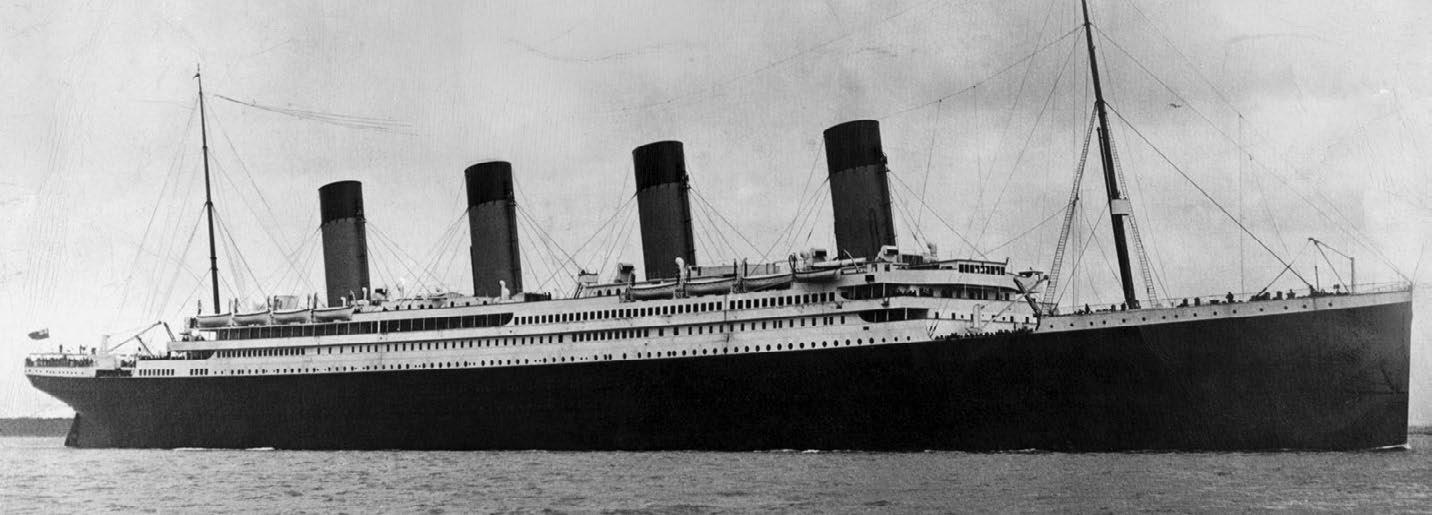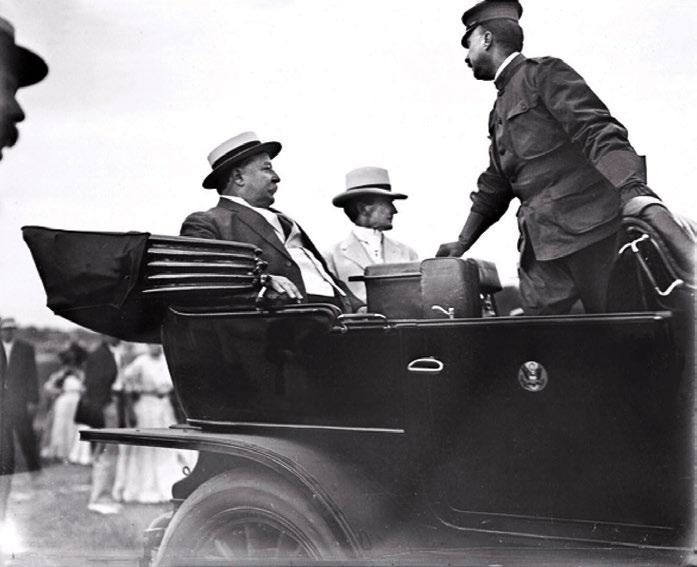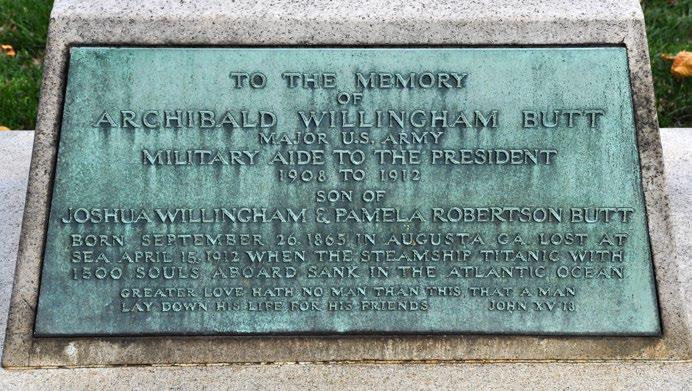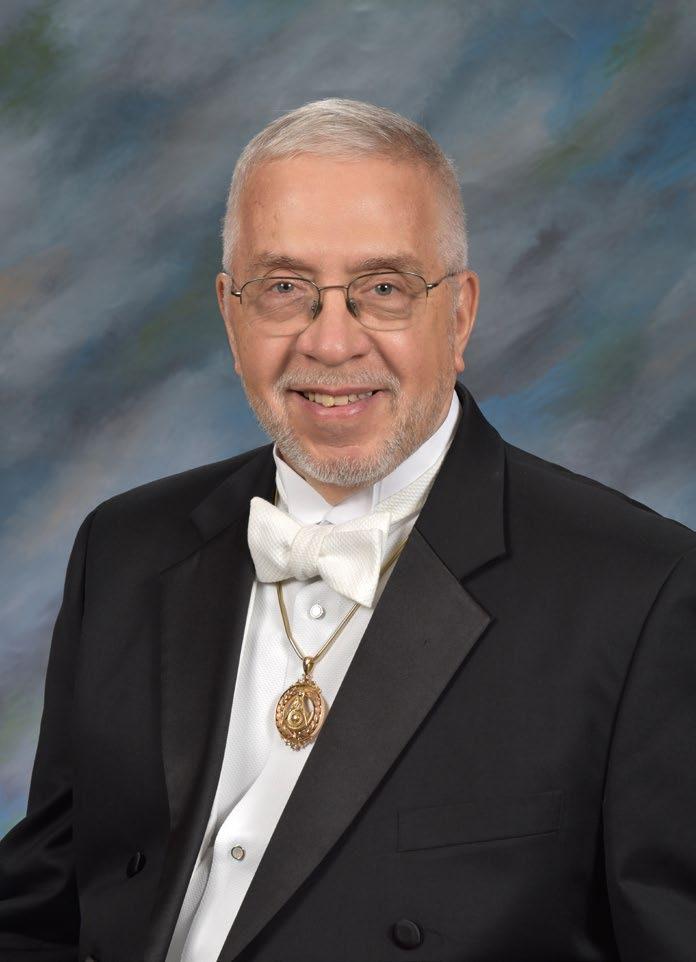
6 minute read
A TITANIC LIFE: THE STORY OF BRO. ARCHIBALD BUTT

By Alan L. Gordon, Deputy Grand Master
Brother Archibald Butt was a Major in the United States Army and an influential aide to Presidents and Brothers Theodore Roosevelt and William Howard Taft. An while his association with the Craft and US Presidents during his time in Washington, DC might be slightly remarkable, the manner of his death is even more so. Because he was one of the over 1,500 people who died during the sinking of the HMS Titanic.
Advertisement
Brother Butt was born in Augusta, Georgia to a military family. Both his grandfather and great-grandfather served in the American Revolutionary War. In addition, he had an uncle who served with the Confederate Army during the American Civil War.
Brother Butt was a journalist in his early adult life, which garnered him the attention of several political figures. This attention earned him an appointment as First Secretary to the American Ambassador to Mexico where he wrote articles for several magazines. During the Spanish American War, Brother Butt served in a variety of places and later earned a commission as a Captain in the United States Army. After service as Depot Quartermaster in Havana, he was ordered to return to Washington to serve as an aide to President Theodore Roosevelt. While there, Brother Butt became close friend with the President. His organizational skills helped to convert chaotic White House receptions into orderly efficient events.
In early, 1912, Brother Butt was caught up between the broken friendships between Roosevelt and Taft at a time when Roosevelt was forming his Bull Moose Party and planning a run for a third term as present, a move that ultimately resulted in the election of Woodrow Wilson to the presidency. During this time, Brother Butt requested a leave of absence from his White House duties.
On March 1, 1912, Brother Butt and his housemate, Francis Millet, left for a 6-week vacation in Europe. Butt booked passage on the RMS Titanic to return to the United States. He boarded the ship at Southampton, in England on April 10, 1912; Millet boarded the ship at Cherbourg, France, later that same day. Butt was playing cards on the night of April 14 in the first-class smoking room when the Titanic struck an iceberg and sank two and one half hours later.
There are several accounts of Brother Butt’s actions during those two-and-a-half-hours, though none can be verified. One account had the ship’s captain, Edward J. Smith, telling Butt that the ship was doomed, after which Butt began to act like a ship’s officer supervising the loading and lowering of lifeboats. The New York Times also claimed that Butt herded women and children into lifeboats.
Another account said that Butt, gun in his hand, prevented panicked male passengers from storming the lifeboats. Yet another version said Butt yanked a man out of one of the lifeboats so that a woman could board. In this story, Butt declared, “Sorry, women will be attended to first or I’ll break every damned bone in your body!

Titanic before her fateful first voyage
One account tells of Butt preventing desperate steerage passengers from breaking into the first class areas in an attempt to escape the sinking ship. Walter Lord’s book A Night to Remember disagrees with claims that Butt acted like an officer. Lord says Butt most likely observed the ship›s evacuation quietly. For instance, many newspapers repeated a story allegedly told by Marie Young. This tale says that Butt helped her into Lifeboat No. 8, tucked a blanket about her, and said, “Goodbye, Miss Young. Luck is with you. Will you kindly remember me to all the folks back home?”, but Young later wrote to President Taft denying she ever told such a story.
Even Butt’s final moments remain in dispute. Dr. Washington Dodge says he saw John Jacob Astor and Butt standing near the bridge as the ship went down. Dodge›s account is highly unlikely, as his lifeboat was more than a half-mile away from the ship at the time it sank. Other eyewitnesses say they saw him standing calmly on deck, or sideby-side with Astor waving goodbye. Several

An artist’s recreation of the sinking of the Titanic
accounts had Butt returning to the smoking room, where he stood quietly, or resumed his card game. But these accounts have been disputed by renowned Titanic author John Maxtone-Graham.
The only things we know for sure: Butt died in Titanic’s sinking, and his body was never recovered.
Major Butt has figured in several fictional novels surround the Titanic. Once such account, represented that Major Butt was on a secret mission and was returning with documents which could have prevented World War One, but rather than complete his mission, he sacrificed himself so that women and children might be saved.
Major Archibald Butt was initiated, passed, and raised to the sublime degree of Master Mason. At the time of his death, he was a member of Temple Lodge #32 (now Temple-Noyes Cathedral Lodge #32). While the records of Brother Butt within the lodge are not clear, it does explain the frequent visits to the lodge of Brother and President Taft, whose signature is plainly found in the guest register in the early days of the lodge. In addition, the lodge history records a letter sent by Brother Butt from the Rock of Gibraltar telling the lodge how he was looking forward to seeing everyone again upon his return. Sadly, that reunion was never to occur. The letter arrived at the lodge after the sinking of the Titanic.
On May 2, 1912, a memorial service was held in the Butt family home with 1,500 mourners, including President Taft, attending. Taft spoke at the service, saying,

Archibald Butt (Right) speaks to President Taft at a Wright Bros. demonstration.
Photograph by fellow member of Temple Lodge, Carl Claudy!
At a second ceremony, held in Washington, D.C., on May 5, Taft broke down and wept, bringing his eulogy to an abrupt end.
Today, we can find several memorials to Butt which were created over the years.
A cenotaph was erected to him in the summer of 1913 in Section 3 of Arlington National Cemetery. Butt himself had selected the spot earlier. In October 1913, the Butt-Millet Memorial Fountain, named for Archibald Butt and Francis Millet, was dedicated near the White House on the Ellipse. In Augusta, Georgia, the Butt Memorial Bridge was dedicated in 1914 by Taft, accompanied by brethren of the Temple Lodge #32 who had chartered a boat to go to Augusta to attend the ceremony. (The lodge allegedly had a plaque placed on the bridge in his memory.) The Washington National Cathedral contains a large plaque dedicated to Major Archibald Butt, found on the wall in the museum store.

Butt’s grave marker at Arlington National Cemetery
In recent years, the Butt Memorial Bridge has become the center of controversy as the City of Augusta has tried to remove it. There was at the time a protest with slogans used “Save Our Butt”. The city ultimately relented and the bridge remains today as a memorial to our brother who served our country and was one of many who perished on the HMS Titanic.



